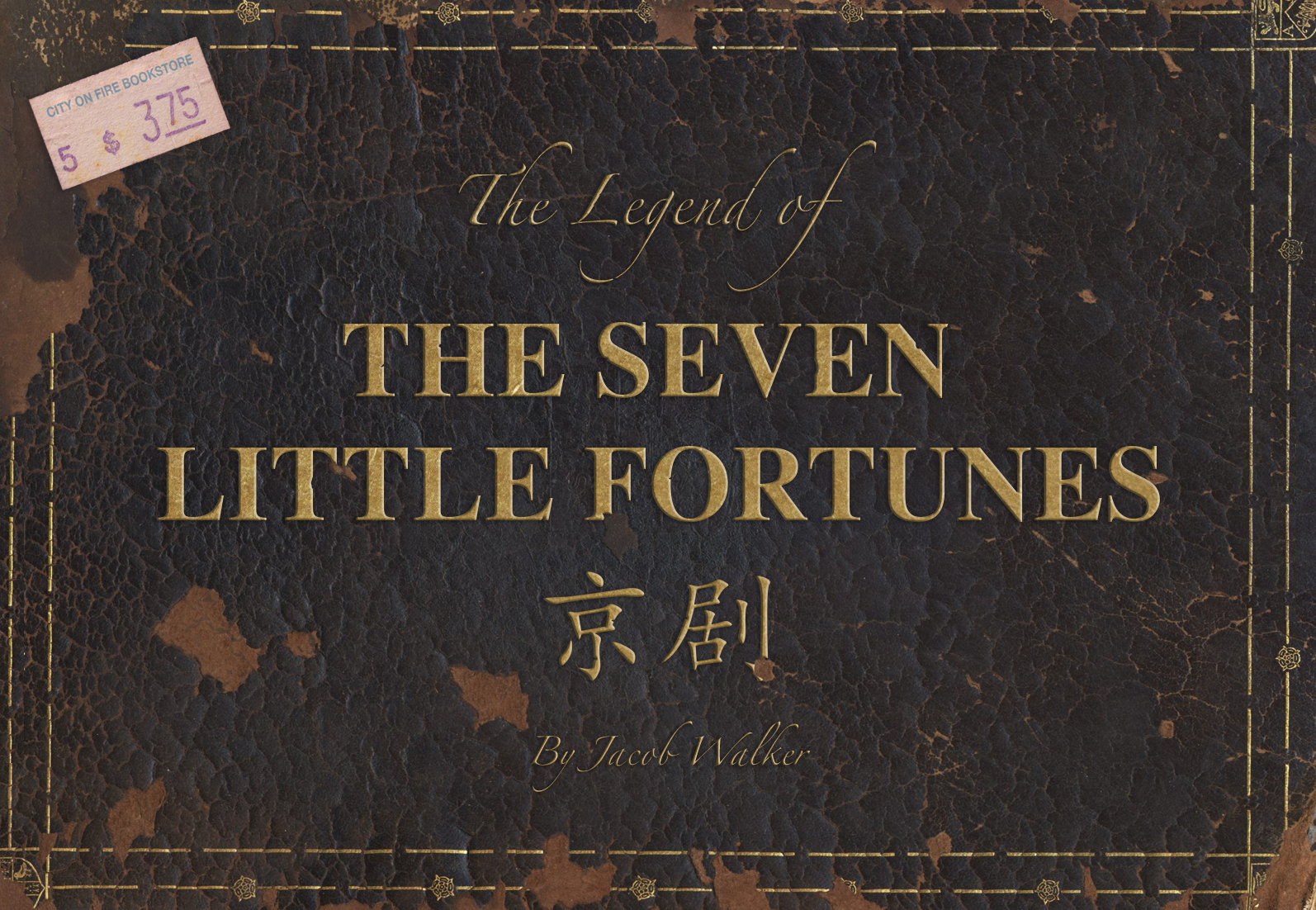
There are many defining moments in the history of cinema, in relation to martial arts, Bruce Lee is still seen as a pioneer and the most famous actor to emerge from Hong Kong. Amazingly influential as he was, especially off screen in relation to the world of MMA (Mixed Martial Arts) – now a billion dollar business in the shape of the UFC, he only made 4 and a half kung fu movies (dying halfway through 1972’s Game of Death), sadly failing to produce a full body of work. It was actually a group of stuntmen who made a name for themselves in the China Drama Academy that would come to revolutionise martial arts movies and dominate in a fashion that we will never see again.
The China Drama Academy was a Peking Opera school situated in Lai Chai Kok in Hong Kong. Peking Opera was born in 1790 and used to celebrate the birthday of the Qianlong Emperor and later became available for the general public. It received a revival and rise in popularity after World War II, as it was a focal point for national identity and Chinese pride. Like traditional Opera the performances tell a story (usually based on myths and legends), which is sung by the actors who also perform acrobatics and kung fu movements. As a result it requires a lot of training, hence the need for Opera schools that start students at a young age. This became an option for poor parents with hyperactive children, who could learn a skill and get food and board.
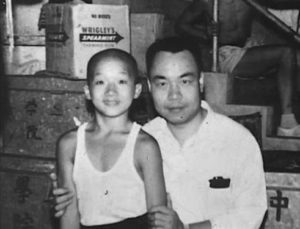
Jackie Chan and Yu Jim-Yuen.
One such hyperactive child named Chan Kong Sang arrived at the school in 1960, which was owned by the notoriously strict Yu Jim-Yuen. He was eventually adopted by the master, taking on the name Yuen Lo but would become to be known as Jackie Chan.
In his autobiography I am Jackie Chan: My Life in Action, he describes the harsh regime he had to endure, waking at 5am, forced into the splits for hours on end and being beaten if you were naughty. He also describes meeting Sammo Hung and Yuen Biao at the same school; this meeting would change the course of the film industry as these three students eventually stood out and were recruited into The Seven Little Fortunes.
The Seven Little Fortunes were a performance troupe consisting of the best students at the China Drama Academy. They were interchangeable and consisted of as many as fourteen but only seven would perform on stage at one time.
Other noted members included Corey Yuen (actor and director best known for 1988’s Dragons Forever and 2002’s The Transporter), Yuen Wah (famously moustached actor who plays a brilliant villain in 1987’s Eastern Condors), Yuen Tai (actor and martial artist known for 1983’s 8 Diagram Pole Fighter), Yuen Miu (bit part actor and one of the action directors on 1994’s Drunken Master 2) and Yuen Bun (actor, action director noted for directing 1993’s Once Upon a Time in China IV).
When these performers got older, and were ready to leave the school they discovered that Hong Kong of the 1970’s had fallen out of love with Peking Opera and fallen in love with kung fu movies, first with the Shaw Brothers epics and then with a charismatic young actor named Bruce Lee.
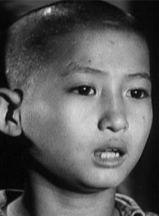
Sammo Hung
Sammo Hung (known as Yuen Lung at this time, like Jackie adopting his teacher’s name) is older than Jackie Chan by two years and thus had been working as an extra, then stuntman and action coordinator for Shaw Brothers since he was fourteen. So when he left the Drama academy he continued to work in the film industry, it was a natural fit considering the skills he had learnt and the popularity of kung fu movies at the time. Jackie and Yuen followed Sammo shortly after, plying their trade as stuntmen on various film productions.
Bruce Lee, after impressing in dramatic roles in films like 1960’s The Orphan, had starred in his first martial arts movie: 1971’s The Big Boss and instantly became a phenomenon in Hong Kong. When an especially daring stuntman was needed for his next feature 1972’s Fist of Fury, Jackie was recommended and ended up doubling for the Japanese villain, being kicked through a Shoji door by a screaming Bruce. The Three Dragons (as Sammo, Jackie and Yuen would later become known) were then united for the first time, all playing stunt men on 1973’s Enter the Dragon, Sammo looking very fresh faced fighting Bruce in a MMA style bout, featuring fingerless gloves and fetching black pants. Just as these wannabe film stars were finding their feet, Bruce Lee died un-expectantly in 1973, casting a dark shadow over the industry and plunging it into the Bruceploitation era.
Those films have their own article on this site, so I will just say it is a ridiculous and luckily short lived era. However it did affect one of our protagonists: Mr. Chan. After impressing in bit parts, stunt skills and work ethic he signed a multi-picture deal with Lo Wei Motion Film Productions, starting with New Fist of Fury, a terrible attempt at casting Jackie as the new Bruce Lee. The film vaguely resembles the plot of 1976’s Fist of Fury with a local karate master trying to take over all the kung fu schools in Japanese occupied Taiwan. Jackie plays an irritating thief who has to learn kung fu to survive, the action is especially poor and it doesn’t play to any of Jackie’s strengths in comedy or action.
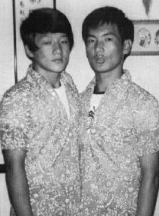
Jackie Chan and Corey Yuen.
While Jackie was trapped in Lo Wei hell, making movies that didn’t suit his style, Sammo made his starring and directorial debut with 1977’s Iron Fisted Monk. Many of the tropes of this film will be refined by Sammo over the next few years as he found his own style, which is very different from Bruce Lee and the Shaw Brothers movies he had worked on previously. He would usually play a dim witted but lovable character, in a low paid job who is swept up in a real historical situation. He would either be naturally tough or learn that skill from a beggar or unusual master. Sammo’s films are usually violent with choreography so powerful you feel the impact deep in your bones. He would often feature violence against women, whether this was a way of keeping everyone on an equal playing field or he didn’t get enough dates as a younger man, I am not quite sure.
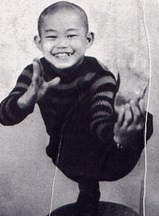
Yuen Wah
Sammo plays Hawker, a foolish but kind hearted down and out who is trained by the Iron Fisted Monk of the title, and ends up rebelling against the evil Manchu’s. The action uses traditional kung fu forms but the pace is faster than had been seen before, using the timing learned from those many years training in Peking Opera, and the stunts are hard hitting with Sammo and his attackers flipping, slamming and breaking through objects. Sammo is especially impressive, though not as large as later years, he is rotund to say the least, yet his energy, power and acrobatics are a sight to see. He uses this power unlike anybody seen on screen before using throws, trips and sometimes even elbow drops to dispatch his opponents. Sammo had finally smashed onto the scene and he was planning on staying for a very long time.
Jackie Chan had been toiling away making unpopular movies with Lo Wei such as 1976’s Shaolin Wooden Men and To Kill with Intrigue, the latter especially being an example of the wrong role for Chan due to his character being stoic, serious and even villainous; something that doesn’t suit his demeanour. Therefore Lo Wei had no problem with Seasonal Films recruiting Jackie for 1978’s Snake in the Eagle’s Shadow, in which the abused orphan Chien Fu is taught Snake Style by the fantastically named beggar Pai Chang-tien, himself a master on the run from the evil Eagle’s Claw clan.
The film was an instant hit with audiences relating well to Jackie for the first time. His character is vulnerable and silly but through hard work and dedication he gains incredible skill, much like Jackie in real life. You really feel the blood, sweat and tears flying off the screen, Jackie putting his body on the line to show that Chien Fu will do anything to succeed, combining Snake Style with Cat’s Claw to hilarious but devastating effect. All those prat falls, training routines and forms at the Opera Academy were there for all to see.
Yuen Biao was given his starring debut by none other than Sammo’s 1979 comedy Knockabout, the film features Yuen as a con artist who vows revenge on the man who killed his brother, this time Sammo plays the beggar who trains him. The film works hard to establish Yuen Biao and really shows off his acrobatic ability, which is extraordinary. The film is fun but it feels like it was testing the ground before Yuen really double flipped onto the screen in 1981’s The Prodigal Son. The second of Sammo’s films to feature Wing Chun after 1978’s Warriors Two, which was unheard of at the time, stars Yuen as a rich kid whose father pays people to lose to him, naturally he comes up against someone who won’t accept the money, an effeminate Wing Chun practitioner and opera star played by Lam Ching Ying (Lam, most famous for his portrayal of a Taoist priest in 1985’s Mr. Vampire, attended a rival opera school called the Chun Chau Drama Society along with future member of Jackie’s stunt team; Mars).
The Prodigal Son sits on the cusp of the old and new style of action that would develop as the trio entered the 80’s. It still uses traditional Wing Chun forms, but introduces a more brutal way of delivering blows that includes head butts, arm breaks and opening up old wounds. This would then develop further into a more ‘Kickboxing style’, as the settings moved to the modern day. Jackie Chan, Sammo Hung and now Yuen Biao had proven that they could carry a movie on their own, they had stepped out of the shadow of Bruce Lee and shown how a new path could be trod. Armed with the unique training they had received, now it was time for the Three Dragons to unite!
Strangely the first film the Dragons appeared in together was 1983’s Winners and Sinners, which was the start of Sammo’s Lucky Stars film series. These mainly concentrate on bawdy comedy and slapstick, performed between the protagonists, usually involving tricking a woman into touching or being close to them. Harmless at the time, but in retrospect the grounds for a sexual harassment case! Jackie and Yuen both have cameos playing policeman with Jackie’s yellow tracksuit burning the eyes, while he dons roller skates in an impressive car chase. Naturally with Sammo as the choreographer, the small pieces of action you do get are first class, employing the ‘Kickboxing style’ I mentioned earlier, full of great reaction falls from the stuntmen and it is the first time we get to see Sammo’s special move: The jumping double leg kick.
They would eventually star together in the irrepressible Project A in 1983. Jackie had signed with Golden Harvest, receiving his first million dollar pay check for 1980’s The Young Master and was an established star, he had taken a jaunt in America that hadn’t gone too well, with 1980’s Battle Creek Brawl, failing to impress mainly because Jackie was restricted in choreographing the action sequences. To get back on track he enlisted the help of his Opera brothers, who all-star in this tale of turn of the century Hong Kong, where the Coast Guard and the Police must put aside their differences to combat a serious pirate problem. The dynamic is perfect here, with so many elements falling into place. We have a rough and ready bar brawl (no beautiful forms here!), Jackie paying homage to Harold Lloyd in Safety Last 1923, but this time dropping from the clock tower, a Peking Opera inspired interrogation and the three brothers coming together to fight the fantastically tattooed pirate Lor Sam Pau. Only together can they defeat such a tough opponent and only together, could they cement themselves as the now true greats of Hong Kong action cinema.
The Three Dragons have only starred in a film together two more times, as of 2018. Jackie and Yuen again appearing briefly in My Lucky Stars and Twinkle, Twinkle Lucky Stars – both in 1985 – two films that feature awesome action but far too much prolonged silliness. A year earlier they came together for a film, which always lingers in the memory due to its unusual premise and setting; the fantastic Wheels on Meals.
The film features Jackie and Yuen as cousins, running a mobile food truck in an alternate Barcelona, where everyone speaks Cantonese! Director Sammo, sets his stall out from the beginning with a training montage, featuring Jackie Chan attempting his Wing Chun form on a wooden dummy, but giving up straight away to engage in a Kickboxing sparring match with Yuen Biao. Sammo is telling the audience what to expect from this movie, we are in the modern day now, and you won’t be seeing Hung Ga or Wing Chun and there is no beggar to learn a specific style from. Our protagonists are martial arts experts and they fight with a modern more western style, and they fight to win. Sammo cemented this by employing two American martial artists as the antagonists – Benny ‘The Jet’ Urquidez – an undefeated full contact kickboxer and Keith Vitalli, an expert in karate. They are incredibly tough opponents, with only the resilience and acrobatic skills of our Chinese heroes being the difference in the end. This toughness and skill is what separated them from the pack in the first place.
We finish this story with 1988’s Dragons Forever, fittingly featuring five members of The Seven Little Fortunes. As mentioned it is the last film to star Jackie, Sammo and Yuen, but is also co-directed by Cory Yuen and features fellow alumni, Yuen Wah, as a freakish evil business man with a penchant for cigars. The plot really encapsulates the relationship between the three at the time. Jackie’s lawyer is recruited by a chemical company to discredit a local fishery, who is suing them over polluting the waters. Jackie decides to hire his two best friends Sammo being an arms dealer and Yuen a mentally unstable thief, to gather dirt. When things inevitably go wrong for them, they fight among themselves, both verbally and physically but ultimately team up to take down the chemical company once they discover it is a front for narcotics.
Like their characters the Three Dragons clearly argued amongst themselves, being control freaks and perfectionists they demanded the best, yet with cooperation and their ability to read each other so well, they could produce something of great quality. This is the reason they would work with each other and other members of The Seven Little Fortunes so regularly, due to the fact no one else could produce the timing and stunt work that they required, with the audience benefiting greatly.
If anything we were spoiled early by such hard hitting action, nothing else seemed to compare to what we saw in the 1980’s. This was a combination of ability, budgetary concerns and the time spent on action over dialogue scenes. Hollywood would eventually learn the virtues of Hong Kong choreography when they hired Yuen Wood Ping (himself a member of The China Drama Academy, leaving before Jackie joined) to direct the action on 1999’s The Matrix. It just took a while!
After Dragons Forever the three brothers remained hugely successful with their own projects: Jackie with the Police Story and Armour of God sequels, Sammo continuing to direct and star in films like 1989’s Pedicab Driver and 1990’s Spooky Encounters and Yuen in 1991’s genre defining Once upon a Time in China eventually directing his only movie to date: 1992’s A Kid from Tibet. Of course they haven’t stayed away from each other and have regularly collaborated in the years since; Sammo directing Jackie Chan in 1997’s Mr. Nice Guy and Yuen Biao serving as the action director on 2000’s Shanghai Noon, with many more examples extending to the present day.
Unfortunately they have never all come together again to headline a film, there have been moments when it was designed to happen, but scheduling conflicts and interests in their own body of work has got in the way. Now with Yuen Biao all but retired and Jackie and Sammo in their 60’s it is very unlikely to happen, and even if it did it would merely be an Expendables-style nod to nostalgia rather than a true action great. It shows the determination and work ethic of Sammo and Jackie that they still have many films slated for release in the next few years. They will probably continue to produce and choreograph as long as they can stand, but when that light is eventually extinguished it will be an emotional day and a realisation what a unique experience they brought to the silver screen.
As aforementioned I don’t believe we will see such an impact by a set of actors again, like the class of ’92 who graduated from the youth team to win the Champions league with Manchester United, they came of age in a unique set of circumstances and those conditions have changed. Peking Opera schools like the ones attended by The Seven Little Fortunes no longer exist and if they did the training would not be as harsh or intense, laws protecting children have come into force in the decades since.
The Hong Kong film industry has also seen a decline, with Golden Harvest studios closing in 2003 and China becoming a global player. Safety concerns and increased budgets have also introduced special effects and wire work to ‘enhance’ an action scene. Naturally we will have many more great martial artists on screen in the future, but we will never have an industry rocked by the death of a legend, cut down in his prime, waiting to be filled with a new kind of screen action, influenced by the skills of the traditional Peking Opera.
Master Yu Jim-Yuen could never have known, as he watched The Seven Little Fortunes perform a manoeuvre for the 100th time that these young children would take their acquired skills, and come to dominate Hong Kong cinema of the late 20th century. The action, comedy and stunt work they perfected continues to dazzle audiences to this day. They must have resented the training at the time, but without it we would never have been exposed to the greatest proponents of on screen martial arts, we may ever see. We can all consider ourselves fortunate, to have experienced The Seven Little Fortunes.

Yu Jim-Yuen’s Seven Little Fortunes: Yuen Bun, Yuen Wah, Yuen Tak, Yuen Ting, Yuen Biao, Jackie Chan and Sammo Hung.

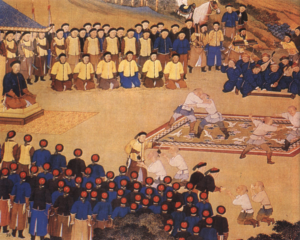
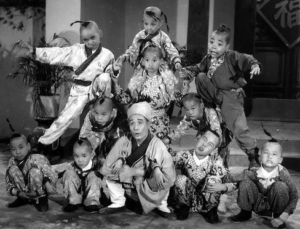
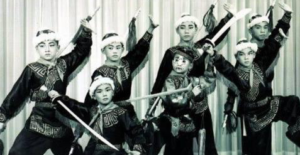
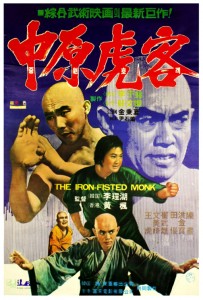
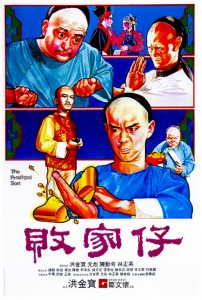
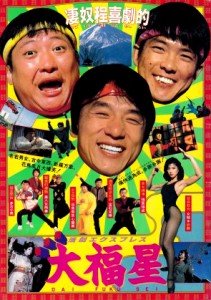
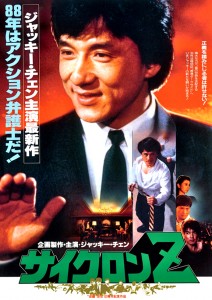
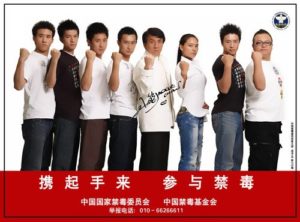


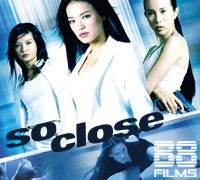
I hope people don’t take away from this article that the Fortunes are great because Yuen Jim was horribly abusive.
I’m sure people might compare this to American children in military school, but I guess we can’t truly understand unless we were there with them.
I read about Sammo’s film, Painted Faces which was loosely based on their upbringing. He portrayed Yuen Jim so viciously that the real Jim told Sammo “I was’t THAT mean!” And Sammo said “Yes you were!”
Oddly, Jackie Chan said the movie was only 20% accurate, and his time at the Opera School was more like Farewell My Concubine. He also said Sammo was mean to him.
Even though these classmates were from a bygone era, I like to think we can still get someone amazing. Scott Adkins and Donnie yen are in their 40’s and 50’s, so we need some new 20 somethings who will last!
“I hope people don’t take away from this article that the Fortunes are great because Yuen Jim was horribly abusive.”
I actually thought that – but not exactly because of this article – it just makes sense that it was a brutal era (even elementary kids got spanked by their teachers). I’m a believer that the greatness of some people, especially in their childhood, is a reflection of the abuse of their mentors. Sorta like Michael Jackson and Brian Wilson were so great because their father’s were abusive and pushed them to perfection.
It’s an interesting thought. I would like to think that the Fortunes, Wilson and Jackson were great in spite of the abuse they received and not because of it. I’m sure they don’t want to be defined by it.
It’s all speculation, really. But it seems like most great artist have had that dark spot in their childhood, whether it be verbal abuse or some traumatic event that forced their souls into art.
Man, I hope Yuen Tak doesn’t read this… 😛
Can we please stop perpetuating Ric Meyers type bullshit like Yuen Woo Ping was a student of Yu Jim Yuen.
Also, the year is 1977 for Ironfisted Monk and 1978 for Snake in the Eagle’s Shadow.
A little fact checking and proof reading never hurts.
Jay, as Jacob said, the years were my fault! They have been corrected. I’m on Filipino time.
Yuen Woo-Ping 袁和平 did learn at Yu Jim-Yuen’s Chinese Drama Academy for a short period of time, although Ric Meyers probably got it all wrong. His disciple name was Yuen Hing 元慶 and he practiced there in the early years of the academy because his father used to teach there.
Great article Jacob,
It’s interesting that Wilson Tong’s father, pulled him from the Opera school, his belief being it was too harsh. This brutal kind of training, was a big factor in who they later become. It will also have broken a lot of young mean and women, the one’s who didnt go onto any great sucess, or simply couldnt surivive the School lifestyle.
Wasn’t Yuen Qiu a member of the Fortunes?
I know she trained under Yu Jim-Yuen, but not sure if she was ever a member of the Fortunes. Were there any female members of the troupe?
I’ve heard after her comeback in Kung Fu Hustle, she was touted as being an original member. If there were other women in the group, I’d certainly like to know.
Great article Jacob, this really is such an important group of people and special piece of cinema history. Excellent to have this story expressed in an article like this – you have plenty of key martial arts films in there.
I’m glad you liked the article Mike and DragonClaws.
I hope I am proved wrong and we do get some fantastic young talent coming through, it is just the circumstances we won’t see again.
I don’t know of any female members of The Seven little Fortunes but as you say Yuen Qiu certainly trained at the opera school.
Jay Lee, you seem very angry and you clearly don’t like Ric Meyers! I know little about him so I can’t comment. I found an article, which stated that Yuen Woo Ping trained at the China Drama Academy. It is quite hard to find his full biography, maybe you could write an article about his life, I would love to know more about such an important figure in action cinema.
With relation to the wrong dates. They were correct when I submitted the article, but were changed by the site. I wouldn’t be too hard on them, they do a great job and have a lot of articles to sort through. I always check my dates and will hold my hands up to any wrong facts 🙂
Dates have been corrected. Sorry about that Ric, err, I mean Jacob. 😉
No, not angry… it can just get kind of tiresome trying to debunk the same misinformation for twenty some years. Not really anyones fault except the ones that spread it in the first place. Wasn’t meant as an attack.
Yuen Woo-ping would visit as his Simon Yuen (Yuen Siu-tien) would sometimes teach at both Yu Jim-yuen’s school and Fan Fok-Fa’s school where John Lone, Lam Ching-ying, Mang Hoi etc were trained
Yuen Qiu and her sister were students of Yu Jim-yuen,
exactly.
Are there any reliable record over when the likes of Meng Yuen Man, Ng Yuen Jun and Candy Wen trained there? The later crop of talents so to speak.
Meng Yuen-Man and Ng Yuen-Jun did. Not sure about Candy Wen.
to be fair there are Chinese Opera schools in mainland China. They may not be as “tough” as Yu-Jim-Yuen’s but I think that term is relative to the time.
Excellent article, very complete and detailed. Will there be an article here that talks about Jackie and Lo Wei? Everything about the two of them. Thanks.
Gabriel, thanks. We definitely have a great team. =) There are no plans for a Lo Wei/Jackie Chan article as of yet, but of course, that can change. I do know that Bey Logan has an upcoming book where he’ll explore their relationship in detail.
Yuen Ting is the student who, according to Jackie’s autobiography, ran away from Yuen’s school one dark night. He later became King Hu’s choreographer of choice in the late 70s